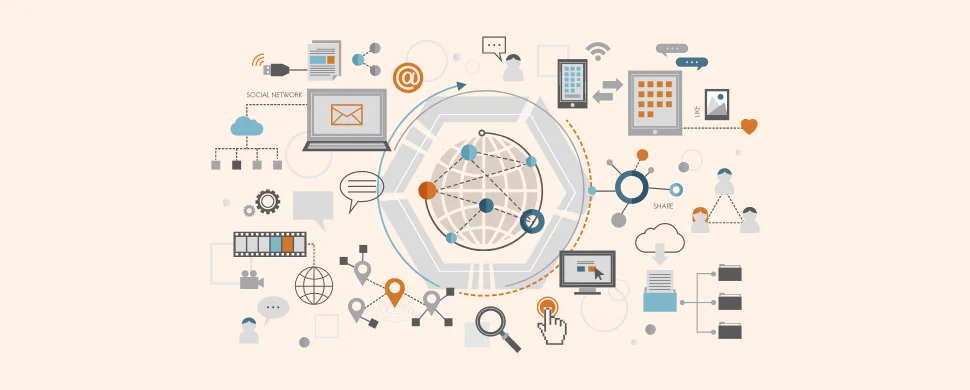Published by Muskan Taneja on June 02, 2023
IoT in Logistics and Supply Chain: Exploring the Benefits, Use Cases, and Challenges
The logistics and supply chain sector are being transformed by the Internet of Things (IoT) revolution. Companies can improve productivity, streamline procedures, and boost overall efficiency because of IoT technology. IoT devices enable businesses to build more responsive and agile supply chains through automated inventory management, real-time tracking, and monitoring. In this blog post, we will take a look at how IoT is being used in logistics and supply chain management, the benefits it offers, its potential use cases, as well as some of the challenges that may arise from its implementation.
What Is The Internet of Things (IoT)?

The Internet of Things is the term used to describe the expanding network of physical objects linked to the Internet. Everything from cellphones and wearable technology to home appliances and automobiles falls under this category. IoT has the potential to alter how we live, work, and play by improving the convenience, effectiveness, and safety of our daily activities.
IoT is already starting to majorly impact logistics and supply chains. IoT can provide real-time visibility into every stage of the journey from production to delivery by connecting devices and sensors throughout the supply chain. This allows businesses to optimize their operations for greater efficiency and responsiveness.
There are many benefits of using IoT in logistics and supply chains. However, some challenges need to be addressed. Security is a major concern regarding IoT, as hacked devices could cause serious disruptions to supply chains. Additionally, maintaining such a vast network of connected devices can be difficult and expensive. Despite these challenges, IoT is expected to play a key role in transforming logistics and supply chains in the years ahead.
How Can IoT Be Used For Logistics And Supply Chain Management?
IoT can play a significant role in logistics app development and supply chain management, providing benefits such as real-time tracking of assets, improved inventory management, and reduced costs. IoT implementation can provide difficulties, too, including issues with data security and privacy.
IoT may be utilized in several ways when it comes to logistics app development and supply chain management. For example, GPS tracking devices can be attached to vehicles or shipping containers to provide real-time information on their location. This can help managers keep track of assets and better plan routes. Additionally, sensors can monitor inventory levels, allowing for just-in-time replenishment and reducing the need for costly storage space.
Benefits Of Using IoT In Logistics And Supply Chain Management
The Internet of Things (IoT) is revolutionizing the logistics and supply chain management industries. By connecting devices and machines to the internet, IoT enables organizations to collect and analyze data in real time, providing unprecedented visibility and insight into their operations. This has several benefits for both businesses and consumers:
1. Enhanced Efficiency

By using IoT devices to track inventory levels, businesses can ensure that they always have the right amount of stock on hand, minimizing waste and reducing the need for costly emergency orders. Additionally, by monitoring the location and status of deliveries in real-time, businesses can avoid delays and disruptions caused by misplaced or missing items.
2. Better Customer Service
With IoT data, businesses can provide their customers with up-to-the-minute information on the status of their orders. This not only increases customer satisfaction but also reduces the number of calls and inquiries made to customer service representatives.
3. Reduced Costs

IoT can help businesses to reduce their operating costs in several ways. For example, by reducing the need for manual labor through automation, or reducing wastage through improved inventory management. Additionally, because IoT provides greater visibility into the supply chain, businesses can identify areas where costs can be reduced or efficiencies increased.
4. Increased Security
IoT devices can be used to provide enhanced security measures throughout the supply chain, such as tracking access to sensitive areas or monitoring suspicious activity. This can help businesses to better protect their assets and ensure that their operations remain secure.
5. Improved Visibility
IoT devices can be used to track the location of assets throughout the supply chain. This information can be used to identify bottlenecks and optimize routes. Additionally, real-time tracking can provide visibility into conditions such as temperature or humidity, which can impact the quality of products.
6. More Accuracy

IoT sensors can be used to collect data about conditions throughout the supply chain. This data can be analyzed to identify trends and exceptions. Additionally, this information can be used to improve forecasting accuracy, which can help minimize disruptions due to stockouts or overages.
Use Cases Of IoT In Logistics And Supply Chain Management
The advancement of technology has led to the development of new and innovative ways to streamline logistics and supply chain management. The Internet of Things (IoT) is one such technology that is revolutionizing the way these industries operate. IoT in logistics and supply chain management can be used in several different ways to improve efficiency, accuracy, and transparency throughout the entire process.
One of the most important use cases for IoT in logistics is asset tracking. By equipping assets with IoT devices, businesses can gain real-time visibility into their location and status. This information can be used to optimize routes, ensure timely deliveries, and avoid costly delays. In addition, asset tracking can also help businesses recover lost or stolen items.
Another everyday use case for IoT in logistics is monitoring environmental conditions. Sensors can be used to track temperature, humidity, light exposure, and other factors that could impact the state of shipments. This information can be used to make adjustments to the shipping process to protect sensitive items from damage.
Finally, IoT can also be used to collect data about customer behaviour. This data can be used to improve the accuracy of delivery estimates and better understand customer needs. Additionally, this data can help businesses identify trends and optimize their operations accordingly.
Challenges Of Implementing IoT In Logistics And Supply Chain Management
IoT is poised to revolutionize logistics and supply chain management, but there are still many challenges to implementing it effectively. One of the biggest challenges is integrating the various systems and devices that make up the IoT ecosystem. Another challenge is managing big data generated by IoT devices. This data must be stored, analyzed, and used to improve decision-making in real time.
Other challenges include ensuring the security and privacy of data, developing standards for interoperability, and managing the power consumption of IoT devices. Despite these challenges, the potential benefits of IoT in logistics and supply chain management are too great to ignore. With proper planning and execution, businesses can use the IoT to improve efficiencies, reduce costs, and gain a competitive edge.
Conclusion
IoT technology is proving to be a game-changer for the logistics and supply chain industry, offering numerous benefits in terms of efficiency, cost savings, and customer satisfaction. However, its implementation requires significant investment and comes with various challenges that organizations must overcome if they wish to reap the full rewards of this innovative technology. We hope that our article has provided you with valuable insight into some of how IoT can revolutionize this sector and offered advice on how it can best be adopted by businesses.
Also, It's crucial to understand that integrating IoT into an organization takes much skill and work to reap its benefits without experiencing any negative effects. To obtain a successful IoT solution, it is, therefore, most logical to employ the help of a trustworthy and knowledgeable logistic mobile app development company. At Innow8 apps, our talented logistic app developers will deliver you effective software services created exclusively with the Internet of Things integration.
Look how IoT works in Logistics and Supply Chain
Recent Blogs:

The Ultimate App Security Checklist for Aspir...
Explore this comprehensive checklist to strengthen your apps against potential threats and p...
Read More
How does DoorDash works? | DoorDash Business ...
Unveiling the success mantra of DoorDash's customer-centric business model in the online foo...
Read More
Why Hire Full-Stack Developers? - A Complete ...
Learn about the advantages of hiring full-stack developers for your projects. Contact us tod...
Read More